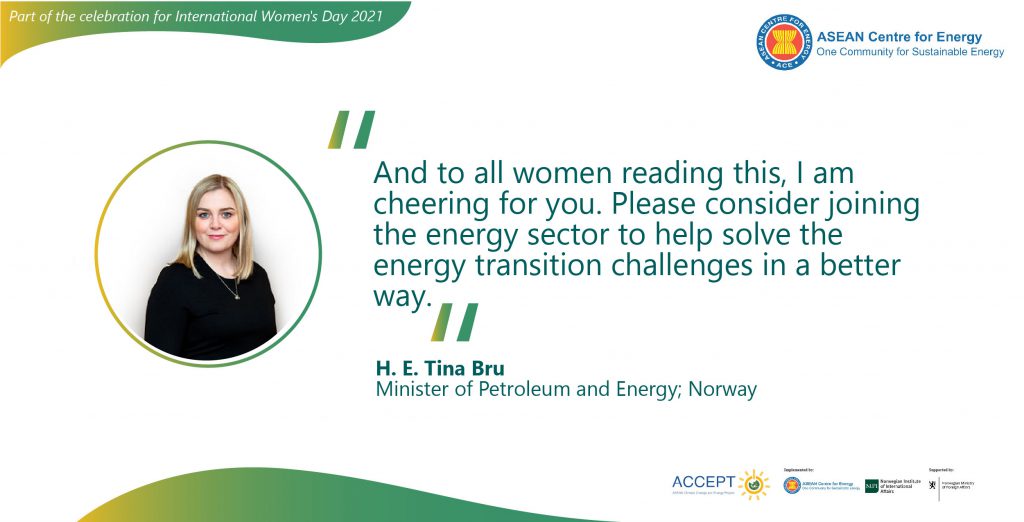ASEAN Women in Energy-Climate

Under the ASEAN Plan of Action for Energy Cooperation (APAEC) Phase II: 2021-2025, ASEAN is committed to reinforce the efforts to meet the 23% renewable energy (RE) share in total primary energy supply (TPES) and 35% RE share in total installed power capacity by 2025. With that, ASEAN needs to aggressively increase 80+ GW of renewable capacity by 2025. Accelerating the RE deployment would not only create new opportunities but could reduce the social cost over 700 billion USD by 2040 as projected in the 6th ASEAN Energy Outlook.
Noting the urgency of massive energy transformation in ASEAN, we need a systematic change that value inclusion and equality in our society. To date, women only represent 32% of RE workforce worldwide. To fill in the growing employment needs, the RE industry needs to engage more women to accelerate just energy transition. In general, women have greater awareness of environmental, social, and governance (ESG) factors and sustainable development goals (SDGs). Therefore, gender equality is fundamental fairness to ensure just energy transition and women could provide insightful views on the policy and investment decisions of RE projects.
With this backdrop, the perspectives of women who work in energy and climate nexus in ASEAN would be an important contribution to the discussion of inclusive energy transition. Hence, through ASEAN Climate Change and Energy Project (ACCEPT), ASEAN Centre for Energy (ACE) aims to promote the importance of gender equality in energy transition by asking perspectives from women who work as policy makers, academies, and leaders in state-owned and private companies.
The objectives of this initiative are:
- To gain perspectives about women in energy transition
- To share awareness of the vital role of women in energy transition
- To empower women to be the agent of change towards low carbon society in ASEAN
Last year, we presented our ACCEPT team that has 5 women out of its 8 members in total. Read it again here.
This year, part of the celebration for International Women’s Day 2021, we are expanding our initiatives to a wider ASEAN perspective through a number of activities.
Raise the Voice!
Gender equality is fundamental fairness to ensure just energy transition. However, women have been under-representated in the energy-climate sector. Thus, we created this initiative to gain women’s perspectives and insightful views on their role and challenges they faced in working in this sector. We have collected the voices of women, representing different countries and institutions, about their role in accelerating just energy transition. Read the results here.
We also have collected a number of video interviews with women leaders in the ministry across ASEAN Member States: Lao PDR, Malaysia, Singapore, Thailand and Vietnam.
Video 1 – Khotamy Chanthamalinh, Lao PDR
Video 2 – Hafiza Yob, Malaysia
Video 3 – Noor Afifah Binti Abdul Razak, Malaysia
Video 4 – Faith Gan, Singapore
Video 5 – Munlika Sompranon, Thailand
Video 6 – Nguyen Phuong Mai, Vietnam
We also have the written opinion from women leaders in Indonesia, Malaysia, Philippines, and an insight from the Minister of Petroleum and Energy of Norway.
- Indonesia – Andriah Feby Misna – Perspective of Women towards Inclusive Energy Transition in ASEAN
- Malaysia – Julia Abdul Karim D.Eng – Perspectives about Women in Energy and Climate
- Philippines – Lilian C. Fernandez – Perspectives about Women in Energy and Climate
Minister of Petroleum and Energy of Norway, H.E. Tina Bru has shared her opinions on women development in the energy sectors. There has been a tremendous improvement for women in labor force in Norway. Two out of 3 women are involved in the workforce and the majority of the women are achieving higher education from universities and other institutions. However, Norway and ASEAN countries still have a long way to go to integrate women in the energy sector. H.E. Tina Bru stated that in Norway, women only makes up to 21% of the workforce in the energy industry, with limited growth each year. One of the biggest challenge is that people are still using the traditional gender roles when it comes to choosing their education which leads to a segregated work market. It is believed that the solution is to highlight the offers from each opportunity, which should be done by the academia, energy organizations, and the energy industry itself. Learn more about Norway’s perspective on Engaging Woman in Energy Development here.
Public Webinar!
Under the theme of “Empowering Women of ASEAN as the Key Player of Just Energy Transition”, we organised public webinar on 10 March 2021.
This webinar is also designated to break the silo of gender issue by empowering the women of ASEAN to not just take part but take the lead in the energy transition.
For more information about the webinar, please visit this page.





